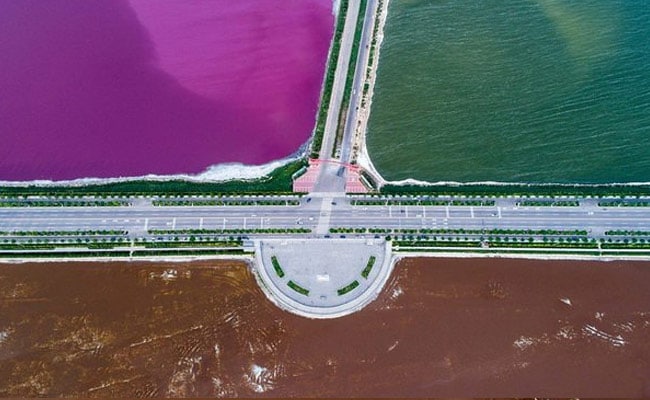
Yencheng Salt Lake is one of the three inland salt lakes with sodium sulfate in the world
Beijing:
A salt lake in China, known as the country's 'Dead Sea', has turned pink on one side, attracting curious visitors to the world's third largest sodium sulphate inland lake, according to a media report.
The pink colour in Yencheng Salt Lake, is due to an algae called dunaliella salina, which changes it from the original colour, making it appear green on one side and pink on the other, state-run Xinhua news agency reported.

The lake, located in northern China's Yuncheng city in Shanxi province, is one of the three inland salt lakes with sodium sulfate in the world, covering an area of 132 square kilometres.
The dual-colours have lasted for many years, and the view only disappears in winter when the lake dries up. The lake was also in the news last year, when it turned blood-red because of the same algae.
According to geologists, it was formed about 50 million years ago. The salt content in it is similar to that of the Dead Sea, allowing humans to float on it, thus earning the moniker: 'China's Dead Sea'.
Chinese people began making use of the lake at least 4,000 years ago. Today, the lake still produces salt for industrial use, the report said.
(This story has not been edited by NDTV staff and is auto-generated from a syndicated feed.)
The pink colour in Yencheng Salt Lake, is due to an algae called dunaliella salina, which changes it from the original colour, making it appear green on one side and pink on the other, state-run Xinhua news agency reported.

The lake, located in northern China's Yuncheng city in Shanxi province, is one of the three inland salt lakes with sodium sulfate in the world, covering an area of 132 square kilometres.
The dual-colours have lasted for many years, and the view only disappears in winter when the lake dries up. The lake was also in the news last year, when it turned blood-red because of the same algae.
According to geologists, it was formed about 50 million years ago. The salt content in it is similar to that of the Dead Sea, allowing humans to float on it, thus earning the moniker: 'China's Dead Sea'.
Chinese people began making use of the lake at least 4,000 years ago. Today, the lake still produces salt for industrial use, the report said.
(This story has not been edited by NDTV staff and is auto-generated from a syndicated feed.)

